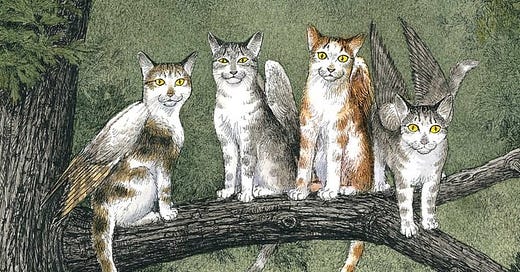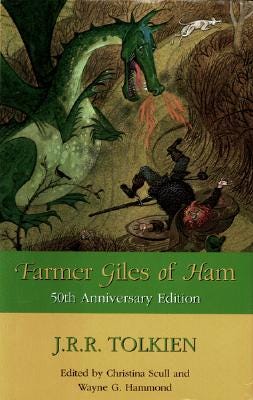Topics
Library fines
Harry Potter from the point of view of two exorcists
Chapter Books—>Ursula K. Le Guin: Catwings & Catwings Returns
Picture Book—>Kenneth Grahame/Alex Willmore: Duck’s Ditty
Reading List for May
April’s Perspective Shifts
Have you ever read or heard or experienced something which profoundly reshaped your perspective on the world at large?
Over the past five or more years, it seems as though this has been a near daily occurrence for me. And yet, just when I marvel at how much differently I see the world now versus even a few years ago, I am exposed to yet more ideas and concepts which have left me pondering all that I know, do not know, or even can and cannot know. Is it just me or does anyone else experiencing an acceleration of revelations? Is this the apocalypse everyone was warning me about or am I being too literal?
Library Fines
One such perspective shift, though minor and quite unexpected, came about via a Substack discussion on library fines. I hadn’t realized how universal it had become for libraries to drop library fines until I came across a discussion of it here on Substack. I thought a lot about library fines this month, why they are implemented, and asked myself why on earth it bothered me so much that there is a trend to remove them. (As one librarian put it, “Why do you care? Are you saying you’re upset about not paying library fines?” My response, “Actually…yes!”)
To be reasonable, though, I did make the effort to hear different perspectives. I called libraries from seven different geographically disparate states (in the United States) and spoke with a dozen librarians, I asked each if they had library fines and, if not, why not. I was quite surprised at the wealth of perspective that was given. No two libraries gave the same reasons, though patterns did emerge. A couple had no idea why they stopped library fines, but knew they were being subsidized to compensate for the lost revenue. A couple of others said that there weren’t getting significant enough amount of money from fines anyway, though subtleties of their arguments showed that they were being subsidized in ways that made them more money in other ways with the front of being equitable. Another said they kept their fines because economically their library hit hard times financially and they relied on the fines to support the library. Another said it was because it cost too much to collect the fines. Many mentioned the burden on the negative interactions that were being had with patrons. All said that they focused on simply getting the materials returned.
Something else struck me: there weren’t any male librarians. There are two in my local library, so I know they still exist. In this day and age where “diversity” is pushed, I have become far more sensitive to such patterns. Is there a correlation or even causation in this trend of female librarians and the removal of library fines?
After having heard what they had to say, I would argue that the movement is not only NOT organic, but that there is a lot of money behind the scenes which is playing a role in the “trend” of creating “equitable services” for library patrons. The libraries receiving subsidies remove the fines under the guise of equity, inclusion, and fairness. The ones who do not are not getting subsidies.
My own take is that this “trend” is in no small part playing a role in the larger destruction of the social contract and one of countless death by a thousand cuts of the social fabric. What is being touted as “fair and equitable” purportedly for people from socio-economically disadvantaged groups, people of color, and children (what an insult to all three groups!), is in fact the punishment of those who agree to participate freely in returning books on time, so that others may also borrow the books. It contributes to chaos, encouraged disorganization, relinquishes duty of care and individual responsibility, and takes away meaning from participation and contributing to the system. (Yes, I understand life happens and when it did, I accepted my own culpability and paid a fine knowing that I was in fact contributing to a cause that I was personally supporting.) Furthermore, by not having deadlines, it lengthens the time one might completely lose track of the materials and instead of being a simple fine, becomes a lost book and the worse consequence of being barred from the system altogether is then given. But, it’s for the poor people and people of color and the children, so insert manipulative name-calling here if you don’t support it.
I’ll spare you the rest of the details, though would love to hear what is happening in your neck of the woods! I’m especially interested to hear from those who are not in the U.S. Is this yet another “trend” that is happening across the Anglosphere?
Exorcism Classes Specifically For Harry Potter
There were several interviews I ended up listening to this month that showed me a different way to look at the world. One was an interview of a former Satanist1 and the other three were interviews with exorcists. Now, I have to admit, this is not a normal topic of interest for me. In fact, quite the opposite. I’m actually not even sure I clicked on it, though I know I was offered the video more than once and I did not click on it many times over. I’m just not curious about the occult. I never even liked “magic” tricks. Yet, I did eventually listen and I’m glad I did. It made me really think quite deeply about my own ignorance and how I view the world.
Something which struck me was two of the exorcists speaking about how their training included a class specifically about Harry Potter. Their take is an interesting and I think one which deserves mention: the casual blending of good and evil. It never occurred to me that a “spell” or “brew” was actually evil in the first place as I didn’t even know it was a thing. Apparently, it is. It made me take a step back from reading what I had originally planned on reading this month, in order to evaluate what I know (and more to the point don’t know) about evil. Am I actually, in my own ignorance, promoting evil in some of the books I am reading? Do I even know what evil truly is? I have really struggled with this this month. It is the reason why I am limiting the books for this particular newsletter.
“That was a time in my life where I saw how much those things that we pursue as entertainment can have an effect on us.” —Exorcist Father Carlos Martins2
Indeed. The stories we listen to, the stories we tell each other, the stories we tell our children all have a profound effect on us. It defines us as individuals and it defines us culturally. So, great care must be taken in deciding which stories to tell…and why. I would argue that this is the reason why we must all be part of the conversation. What are your thoughts?
Chapter Books:
Ursula K. Le Guin: Catwings & Catwings Return
Catwings3 & Catwings Returns4 are the first and second, respectively, of the four books of the Catwings chapter book series. To me, as I read these books, I could not help but be constantly reminded of a child I knew who was related to Le Guin and grew up on her books, in the sense that the imagination and logic must have been highly influential. For better or for worse.
I enjoyed the premise of flying cats. I did not particularly like the adult joke at the very beginning of Catwings in explanation as to the reason why the kittens had wings, but the mother did not. It reminds me of some of the adult jokes inserted into Disney/Warner Brother cartoons that are really for the parents/adults, but sometimes not as over the heads of kids as they might should be. In that way, I found the introduction to be slightly off-putting.
With the said, I enjoy books which shift my perspective and these certainly do. As example, Chapter 3 opens with a dialogue among the animals who have encountered the flying kittens:
It’s absolutely unfair,” the thrush cried.
“Unjust!” the finch agreed.
“Intolerable!” yelled the bluejay.
“I don’t see why,” a mouse said. “You’ve always had wings. Now they do. What’s unfair about that?”
The fish in the creek said nothing. Fish never do. Few people know what fish think about injustice, or anything else.
“I was bringing a twig to the nest just this morning, and a cat flew down, a cat flew down, from the top of the Home Oak, and grinned at me in midair!” the thrush said, and all the other songbirds cried, “Shocking! Unheard of! Not allowed!”
“You could try tunnels,” said the mouse, and trotted off.
The birds had to learn to get along with the Flying Tabbies. Most of the birds, in fact, were more frightened and outraged than really endangered, since they were far better flyers than Roger, Thelma, Harriet, and James.
This conversation is ripe for opening up dialogue with children who tend to always bring up “fairness” when what they really mean is “not advantageous for me.” In this way, the perspective of the mouse holds the key to the concept.
Picture Book:
Duck’s Ditty by Kenneth Grahame, Illustrated by Alex Willmore
Duck’s Ditty5 is a picture book adaption of the song from Chapter 2 of Kenneth Grahame’s 1908 book The Wind In the Willows.6 I really love that the illustrator (Alex Willmore) gave the poem the space to expand out the song’s story in a book all of its own. Each page turn comes with a new perspective that fits with a line of the poem. The book is not only a great stand alone, but is a nice link and homage to the original book.
Reading List For May and Your Perspective
Sitting in my reading box, I have some books that have been suggested either by my own Subscribers or by others here on Substack. If you would care to read those and join in on the discussion, here are a selection of those books I plan on getting to this month:
Your Favorite Seuss: Thirteen Best-Loved Stories
Farmer of Giles by J.R.R. Tolkien7
The Princess & the Goblin by George MacDonald8
The White Company by A. Conan Doyle9
Little Britches: Father & I Were Ranchers by Ralph Moody10
Your voice matters!
Have books to suggest? Please do drop them in the comments!
Have a difference of opinion? Please state it! I would like to encourage everyone, most especially those who have a different opinion than what I have given, to please share that different perspective! It is not my desire to simply talk at people, but rather to engage with others and be stretched in conversation. I do appreciate that you’ve taken the time to give me your attention, the most precious of things we may share with one another! Thank you!
Interview with Exorcist Fr. Carlos Martins [Father David Michael Moses YT} 11/14/2024
https://bookshop.org/a/109392/9781645941606
I’m rather partial to my first edition of the book, a 1965 reset, which contains a beautiful preface from the grandson of the original publisher as well as a note from illustrator Ernest H. Shepherd. They both give their own insights into the author himself, including the original sales pitch of the book and the illustrator’s meetings and shared appreciation of the places and animals which inspired the stories. There are a huge variety of later editions by many other illustrators, which might serve as an interesting comparative study for budding artists; however, I put the original publication here with the idea that without illustrations, the blank slate might inspire rather than influence yet another generation of illustrations.












The same libraries that are hosting drag queen story hours are likely the ones that have given up on collecting fines for over due books, & the common threads are naivety, a distain for the blessings of western culture, and an actual hostility to western culture ( all of which they will regret when the Muslim hordes take over.
"AI Overview
Learn more
The "No More Library Fines" initiative, championed by the Open Society, aims to eliminate overdue fines in libraries, particularly for low-income and under-served communities. The rationale is that these fines can create barriers to access for those who rely on libraries, according to NPR.
Here's a more detailed look:
Rationale:
Libraries are valuable community resources, and fines can create financial barriers, especially for those who may already be struggling financially, according to NPR.
Impact:
Eliminating fines can increase library access, reduce debt, and promote equity in accessing resources, according to NPR.
Open Society's Role:
Open Society, a global foundation, supports initiatives like "No More Library Fines" to address social injustices and promote equitable access to resources.
Examples:
Many libraries, including LA County Library, have already adopted "fine-free" policies.
In essence, the "No More Library Fines" initiative is about making libraries more accessible and equitable by removing the financial barrier of overdue fines, particularly for those who need access to library resources the most. "